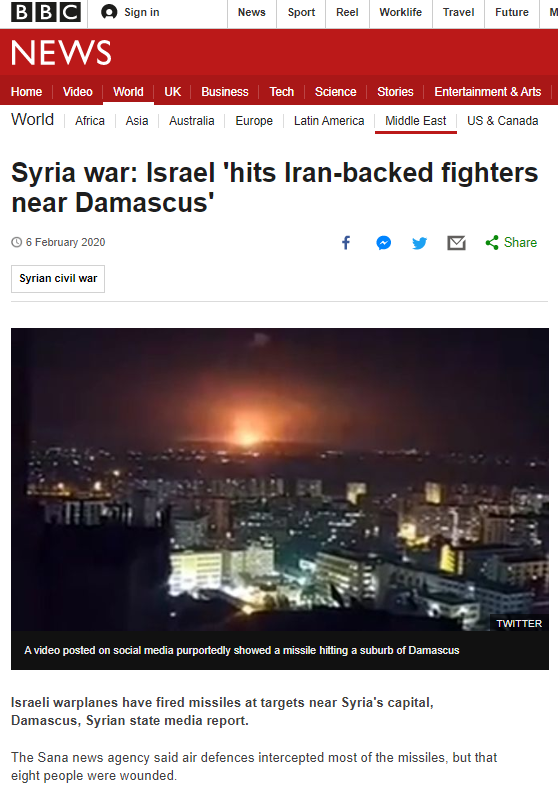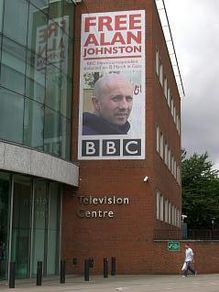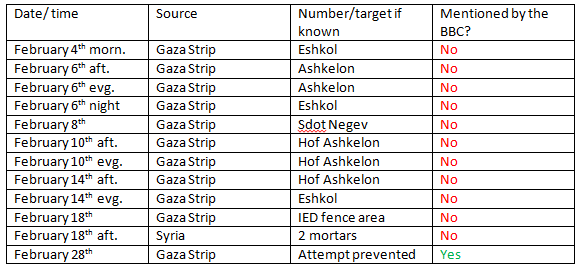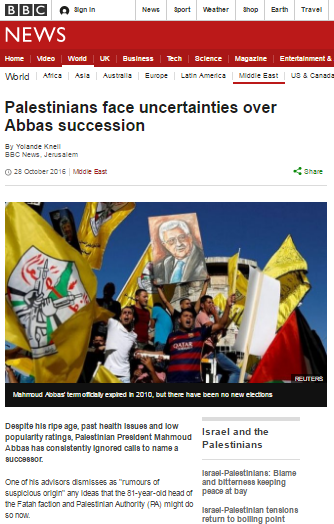On February 6th the BBC News website published a report titled “Syria war: Israel ‘hits Iran-backed fighters near Damascus’” (and bizarrely tagged “Syrian civil war”) on its Middle East page.
At the beginning of the report the two sources upon which it is based are noted:
“Israeli warplanes have fired missiles at targets near Syria’s capital, Damascus, Syrian state media report.
The Sana news agency said air defences intercepted most of the missiles, but that eight people were wounded.
A monitoring group said Syrian army positions and those of Iran-backed militias were hit, killing 23 people.”
Only in the article’s ninth paragraph is it clarified that the Syrian Observatory for Human Rights monitoring group is based in the UK.
As has often been the case in the past, readers found unqualified promotion of propaganda from Syrian regime media – including a link – such as the standard claim that “air defences intercepted most of the missiles”.
“Sana cited a Syrian military source as saying that Israeli warplanes flying over Lebanon and the occupied Golan Heights launched two waves of missiles at southern Syria early on Thursday.
The first wave targeted military positions in the suburbs of Damascus, while the second targeted those in Deraa, Quneitra and Damascus Countryside provinces, according to the source.
“[The] vigilance of our air defence personnel contributed to destroying large numbers of the hostile missiles and the aggression caused the injury of eight fighters, in addition to a material damage,” the source added.”
The BBC’s report even provided (not for the first time) amplification for the Syrian regime’s conspiracy theories:
“The Syrian military accused Israel of launching an “aggressive escalation” in an attempt to “save the armed terrorist organisations which have been collapsing in Idlib and western Aleppo in front of the strikes of the Syrian Arab Army”.”
At no point in the report were readers provided with any warning concerning the lack of reliability of reports put out by the Syrian regime and its mouthpieces and their history of lying about events in Syria.
Readers of the BBC’s report were told that:
“The Syrian Observatory for Human Rights, a UK-based monitoring group, said strikes on Iran-backed militia positions in Kiswa, Muqaylabiya, Jisr al-Baghdad and Izra killed 15 fighters, including five Syrians and at least three Iranians.
And eight Syrian soldiers were killed by missiles that hit air defence batteries near Damascus, it added.”
The SOHR’s report also includes the claim that some of those killed were Iranian-backed militia fighters.
Curiously, the BBC’s 2017 report concerning Iran’s establishment of a military base in Kiswa (also al Kiswah) was not included in the related reading appended to this report but readers were directed to an article about cats. Although readers learned nothing about Iranian military assets in Syria – including the IRGC base near Izra in southern Syria which according to reports includes a base for surface-to-air missiles – they were told that:
“Israel did not comment, but it has acknowledged carrying out hundreds of strikes in Syria in recent years to stop Iranian “military entrenchment”.”
So while the BBC saw fit to qualify the topic of Iranian military entrenchment in Syria by means of punctuation, it did not bother to provide any objective background information concerning that issue.
Once again we see that BBC newsgathering for this report consisted mainly of repeating claims from Syrian state media linked to the regime’s Ministry of Information and from the Syrian regime itself without any evidence of independent confirmation by the BBC.
Given the record of those sources, one would expect a serious media outlet (especially one which promotes itself as an authority on ‘fake news’) to be considerably more cautious about promoting their unverified statements and conspiracy theories to its funding public in supposedly factual news reports.
Related Articles:
BBC News yet again promotes conspiracy theories
Looking behind a BBC News website tag
BBC News website tones down Assad regime propaganda
Despite evidence, the BBC won’t let go of Assad propaganda
More false balance in BBC News report on Douma chemical attack
BBC newsgathering again relies on Syrian state outlets




